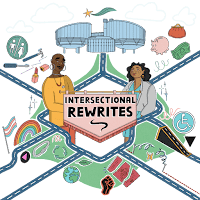We had not yet reported on it here, but last month a call for authors was issued for the book project ''Intersectional Rewrites: European Court of Human Rights Judgments Reimagined''. The book project aims to analyze and rewrite judgments of the European Court of Human Rights from an intersectional perspective.
Here is a description of the project and the call for authors:
''We are inviting proposals to contribute to an edited book, “Intersectional Rewrites: European Court of Human Rights Judgments Reimagined”. In this book, authors will offer their own versions of impactful decisions from the European Court of Human Rights from an intersectional perspective.
The Intersectional Rewrites Project
The European Court of Human Rights often fails to recognise the complexity of compounded harms people experience as a result of multiple marginalisation. “Intersectional Rewrites” imagines a jurisprudence that takes account of the social, economic, and political conditions significant to the lives of people who are multiply marginalised. The book aims to contribute to a broader endeavour of critical rewrites (such as the feminist judgments projects) through an exclusive focus on the critical paradigm of intersectionality. We are currently in conversation with several major publishers to secure the best distribution for our intended audience, and to realise open access.
An Intersectional Perspective
By “intersectional perspective” we mean drawing on Black feminist and critical race theory insights that highlight the significance of multiple and mutually influencing vectors of social division such as gender, sexuality, race, ethnicity, religion, ability, and nationality. In this project, intersectionality serves as a lens to make visible and legible the harms that arise from multiple marginalisation within the context of a European jurisprudence of human rights.
Authors
We are seeking submissions from a diverse group of scholars, researchers, practitioners, activists, and advocates, interested in drawing on their expertise on intersectionality to analyse and rewrite the jurisprudence of the European Court of Human Rights. “Intersectional Rewrites” will present 15 reimagined recent judgments from the Court selected from case law since 2020 that cover a wide range of European countries, legal fields, intersecting identities, and harms. In order to support a diverse group of contributors we are offering a modest honorarium of 500 euro to those who engage in this work outside of a salaried position.
Contributions
Authors will be invited to develop a chapter for “Intersectional Rewrites”, which will have a 5000-7000 word limit to be written in the style of the ECtHR. The core of the rewrite will centre on a reimagining of key passages from the original judgment, and will include a statement of the facts, violations of the Convention, and the conclusions. Rewrites will include a maximum 1000-word reflection from the authors as to their approach, salient considerations, and reflection on choices made in the reimagined judgment.
Process and Timeline
We are aiming to have the community of writers composed by 30 June 2023.
Authors will be invited to a 2-day workshop in the Netherlands in February 2024 to discuss first drafts of their chapters. First drafts are expected to be shared at the beginning of 2024. We will also organise an introductory Zoom meeting to talk about the Intersectional Rewrites project with all the contributors after which draft proposals for a rewrite should be shared.''
Expressions of interest can be made by filling out the form available here. The deadline is 31 May.

